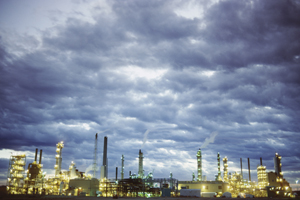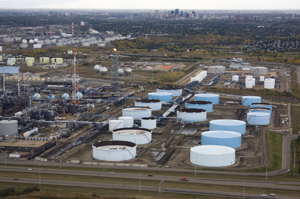European refineries face 'dramatic' future
on
Industry body warns that climate policies and regulatory burdens will have 'major impacts' on EU oil market
European refineries face 'dramatic' future
An inexorable decline in the demand for oil in combination with ever more stringent regulatory burdens will lead to the closure of roughly half of the capacity of the 100 oil refineries in Europe by 2050. This 'dramatic' picture emerges from a new long-term report produced by Europia, the European Petroleum Industry Association. Although Europia accepts that the importance of oil in the European energy sector will decline as a result of climate policies and the rise of renewable energy, it warns that stifling European regulations are threatening the viability of the remaining refineries. This could have major consequences for the European economy and Europe's import dependence, says Europia's Secretary-General Isabelle Muller in an interview with EER.
 |
| European refineries are not only focused on domestic demand |
At the same time, it notes that oil will continue to be an essential element in the energy mix, especially for the transport sector as well as for the petrochemical and other industries. This means that policies that make it harder for the refinery sector to compete internationally and to survive - in other words, that hasten the natural decline of the sector - will have highly adverse consequences. According to Europai, such policies will make Europe more dependent on highly volatile international oil markets. They will harm the existing oil and distribution marketing system, putting at risk the EU internal market for transport fuels. And they will hurt the petrochemical value chain and other directly linked industries, leading to economic damage and job losses.
'We can restructure if we need to [to accommodate the projected drop in demand],' says Europia's Secretary General Isabelle Muller. ‘But in 2050 we will not have a no-carbon economy and we have to safeguard access to oil products. We should not have to decrease capacity faster than demand.' According to Muller, the European refinery sector is faced with a host of regulations that threaten to undermine its competitiveness, such as the EU Emission Trading Scheme, the Energy Efficiency Directive, the Fuel Quality Directive and the Industrial Emissions Directive, to name the most far-reaching ones.
Achievable pathway
On Tuesday, Europia published a "Contribution to EU Energy Pathways 2050", a comprehensive report that provides the industry’s outlook for the future, based on third party data and studies. As the title indicates, it is meant as a contribution to the upcoming Energy 2050 Roadmap which the European Commisison’s Directorate-General of Energy is currently preparing.
In its report Europia presents two potential decarbonisation pathways to 2050, both based on data from the International Energy Agency (IEA). The first scenario is based on the IEA’s 2030 New Policies Scenario (NPS), which takes into account climate policy commitments around the world today, and which Europia has extrapolated to 2050. The second is essentially a “backcast” from the IEA’s ideal climate scenario (the Blue Map Scenario) in which the world has halved its greenhouse gas emissions in 2050.
| 'In 2050 we will not have a no-carbon economy and we have to safeguard access to oil products. We should not have to decrease faster than demand' |
In particular in the transport sector oil will continue to be essential. It will fuel 81% of all transport in the forecast scenario and 55% in the backcast scenario in 2050. The difference between the two scenarios depends mainly on the rate of energy efficiency improvements and advances in the use of electricity and biofuels in transport.
Although Europia does not ‘endorse’ any scenario, it says it does ‘prefer’ a forecast approach, as this ‘builds on experience’ and is ‘more likely to produce an achievable pathway which maintains EU competitiveness’. It is such an approach Europia wants the Commission to use in its own forthcoming energy roadmap.
Supply risks
It is clear that even Europia’s ‘preferred’ scenario implies that EU refining capacity will have to be significantly reduced over the coming decades. By 2030, EU refining capacity could exceed EU demand for oil products by about 25%, says Europia. In 2050, surplus capacity could rise to 40% (and in the backcast scenario even 70%). 'The implications in terms of refinery shutdowns would be increasingly dramatic’, says Europia: ‘from 25 to about 70 nominal closures of an average size EU refinery out of the approximately 100 referineries in 2011’. The scale of rationalisation would dwarf the wave of major closures in the 1980s.
To some extent, the scaling down of the European refinery sector is inevitable, given the expected drop in oil demand in Europe. ‘There will be adaptation [of the oil industry], it will be forced by demand going down,’ says Muller.
But, as indicated, oil will continue to be essential to the European economy. In addition, European refineries are not only focused on domestic demand. They are also active on the international market. In particular, they export gasoline to North America (conversely, North American refineries export diesel to Europe). This means that to be successful, they have to stay competitive on the international market. Otherwise they would be put out of business by their North American, Middle Eastern and Asian competitors.
| In the past year, one-quarter of EU refineries have been affected by temporary or definite closures or sales |
And there other negative consequences if the refinery sector is undermined, notes Europia. For example, the EU would lose its technological leadership in setting global fuel specifications. Up to now, EU refineries have been able to set global fuel standards (outside of North America) in close cooperation with European motor manufacturers. The EU would most likely lose this very important competitive advantage for its automotive industry if its refining sector is stifled.
Then there are negative impacts on jobs and tax revenues. The downstream oil sector today provides national governments in the EU with some €240bn annually in taxes and duties. Jobs too, are at risk – not just in the refining sector, but also in the industries that depend on it, such as the petrochemical and plastics industries, agriculture, construction and shipping. The downstream oil sector in Europe employs 600,000 people, the petrochemical sector another 750,000.
Europia also notes that many refineries already share space with other chemical processes and there could be fresh opportunities to work with other industries. New, integrated manufacturing platforms could serve to adapt oil-based fuels to new engine technology or other end-uses; to co-process or blend oil with different feedstocks (including bio-based); to turn the components of different feedstocks and processes into new products; to further improve the efficiency of refining (e.g. through better control systems), and to provide economies of scale (e.g. to create critical mass for use of carbon capture and storage networks). For these reasons, Europia argues that refining can and should be part of the transition to a low-carbon economy.
Permits
For EU refining to adapt to the decline in oil demand and still be there in 2050 to meet Europe’s needs, means that policymakers should help keep refineries competitive, Europia says. ‘Premature policies that force early withdrawal of refining capacity from Europe would cut off certain future pathways,’ it warns in its report. ‘Additional costs from EU-only policy (e.g. carbon costs) will further aggravate... competitive disadvantages [that refineries already face vis-a-vis new competitors abroad].’
 |
| The current standards force refineries to incur unnecessary costs |
The refining sector is also affected by the Energy Efficiency Directive proposed by the Commission in June. This is currently being discussed by EU member states and the European Parliament. If adopted, it would require member states to assess the efficiency of refineries on their territory. Where this assessment ‘identifies significant discrepancies between the actual energy efficiency levels of such installations and energy efficiency levels associated with the application of the relevant best available techniques’, the Commission proposes ‘requirements to improve the energy efficiency levels’ or ‘that the use of such techniques shall in future be a condition for the permitting of new installations and for the periodic review of the permits for existing installations.’
For Europia, these energy efficiency proposals are an unnecessary duplication of what the carbon market is meant to do. By setting a price on carbon, the carbon market should be driving efficiency improvements of exactly this kind, Beddoes says.
A third regulatory burden for the refining industry is the Fuel Quality Directive. This was agreed by European leaders in December 2008 as part of the package of energy and climate laws that also set up
| The downstream oil sector today provides national governments in the EU with some €240bn annually in taxes and duties |
The one issue holding up agreement about the implementation of this Directive is whether to include a separate default value for oil from oil sands (or tar sands), whose “well-to-wheel” emissions are 23% higher than for conventional oil, at least according to an EU study. Another study suggests oil sands are just 11% more emissions-intensive per barrel of refined produced however. This detbate is still dragging on in Brussels. If the Commission does in the end decide on a separate value for oil sands, Europia says it will further drive up costs for the industry. It will drive up the price of 35% of EU crude supply.
Another important piece of environmental legislation affecting refineries is the Industrial Emissions Directive. This sets Best Available Technology (BAT) standards for all kinds of industrial installations in Europe. According to Europia, the current standards force refineries to incur unnecessary costs.
Targets
Europia notes that all future scenarios carry large uncertainties. In particular, with regard to road transport it is highly uncertain how alternative forms of energy (biofuels, electric cars, hydrogen) will develop. In this climate of uncertainty, Europia says it is not desirable for the EU to advocate any new binding CO2 emission reduction targets for after 2020 in its forthcoming Energy Roadmap. ‘ It’s too early for this,’ says Muller.
Europia expects the Commission to put forward a range of scenarios, some of them “not very far” from what it has presented in its own report. Each scenario will recognise the fundamental importance of oil in 2050, Muller firmly believes. The message she has for policymakers is that it is very much in the EU’s interest for remaining oil demand to be met by healthy EU refineries.
|
Europia's six policy recommendations for the 2050 Energy Roadmap 2. The reality of global competition must be recognised in all policies and the impact on competitiveness be carefully assessed beforehand and then measured throughout their life. Policy should not impose burdens on an industry such as refining which force it to go further than just adapting to reducing EU demand. 3. The limits of EU-only action and the interdependence of the EU with the rest of the world must be recognised. Climate change can only be tackled through global action. The EU should look at the approaches taken by other regions of the world and seek cooperative action for climate change. 4. EU policy should not pick technology winners or pathways. It should promote a consistent CO2 abatement cost across the economy, and then allow the market to operate efficiently. 5. The EU-wide, national and regional impact of all measures should also be carefully assessed. Although policies may be conceived on an EU-wide basis, the impacts on industries, including refining, on jobs and communities will be felt locally. 6. The EU should act as one with a competitive, open internal market. The existing oil products market is an open EU market and fragmented application of policy risks not only disrupting this, but also introduces additional costs and affects security of supply to the consumer. |


Discussion (0 comments)